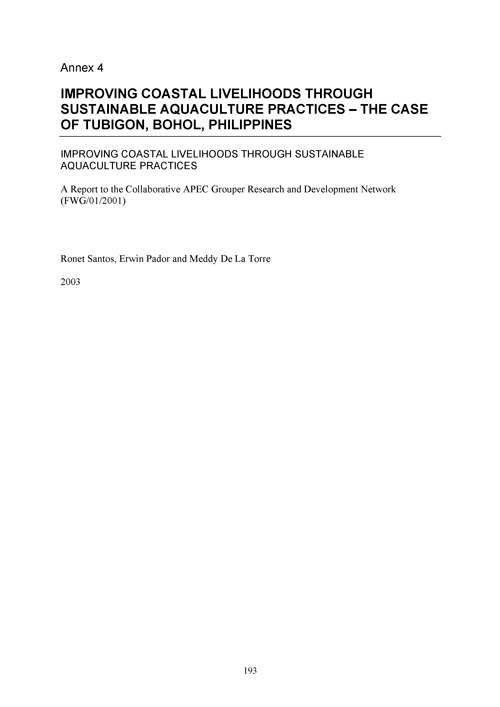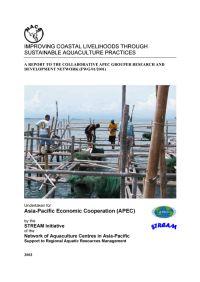Improving coastal livelihoods through sustainable aquaculture practices - the case of Tubigon, Bohol, Philippines
3 February 2004 | Ronet Santos, Erwin Pador and Meddy De La Torre | 4509 Downloads | .pdf | 761.14 KB | Gender, Livelihoods, gender and social issues, Marine finfish, Philippines
The objectives of this study were to:
- Characterise the coral reef fisheries in Tubigon, Bohol, Philippines.
- Derive lessons from the management interventions to eliminate unsustainable fishing practices and improve coastal livelihoods employed by various groups in Tubigon.
The key questions that this study is attempting to answer are:
- How can recent advances in aquaculture of grouper (including mudcrab and lobster) and reef fisheries help improve coastal community livelihoods and prevent unsustainable and destructive practices?
- Is there a role for the private sector in eliminating unsustainable fishing practices and improving coastal livelihoods?
The thesis that a strategy to improve coastal livelihoods would be likely to deal with assetbuilding and strengthening policies, institutions and processes is proven correct. All the components in both areas figured as key elements of a strategy to improve coastal livelihoods. Any management intervention in an area with the same problems Tubigon had in the past should first analyze what has been done in each of the components of the above strategy, and build on these. This means that the intervention does not have to be integrated, but the analysis that would shape the design of the intervention should be holistic.
Introduction of aquaculture projects to improve coastal livelihoods therefore should not be done in isolation but should be informed by such a strategy. Specifically, aquaculture projects should not be introduced if there is no adequate social preparation and if the rationale of the project (poverty eradication) is not clear to project beneficiaries.
The possible role of the private sector in the above can either be very or focused on supporting aquaculture projects. There is a clear role for the private sector in investing in non-fishery-related industries that can absorb human resources who would otherwise have no choice but to add themselves to the burgeoning number of people dependent on the resource. The obvious role of the private sector in promoting sustainable aquaculture projects is to assist in marketing its produce. Less obvious roles include helping with initiatives to deny a market for fish caught through illegal means and exploring possibilities of integrating within price structures of the fish a development fund that could be used to fund aquaculture-related research initiatives.
Grouper aquaculture is not a big industry in the Philippines yet, and therefore it is not yet attracting a lot of investment. In fact, businesspersons we were able to interview complained about the total absence of support from the fishery-related national agencies of the government. It seems before the private sector can be encouraged to support sustainable aquaculture initiatives, the fishery-related agencies of the national government must first demonstrate that it has the political will to craft a sustainable development framework for fisheries in the country that would provide a good balance between food production and resource protection and conservation.
Copyright, all rights reserved.

